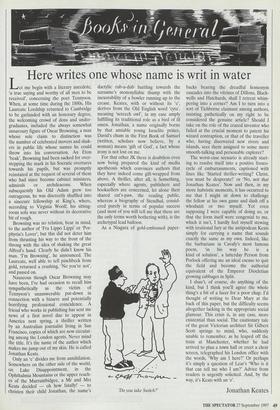Here writes one whose name is writ in water
Let me begin with a literary anecdote, `a true saying and worthy of all men to be received', concerning the poet Tennyson. When, at some time during the 1880s, His Laureate Lordship returned to Cambridge to be garlanded with an honorary degree, the welcoming crowd of dons and under- graduates, included the always somewhat unsavoury figure of Oscar Browning, a man whose sole claim to distinction was the number of celebrated movers and shak- ers in public life whose names he could throw into his conversation. An Eton `beak', Browning had been sacked for over- stepping the mark in his Socratic overtures towards his pupils, but was promptly reinstated at the request of several of them who had since become cabinet ministers, admirals or archdeacons. When subsequently his Old Adam grew too outrageous, he was discreetly shuffled into a sinecure fellowship at King's, where, according to Virginia Woolf, his sitting- room sofa was never without its decorative bit of rough. Browning was no relation, bear in mind, to the author of `Fra Lippo Lippi' or Tor- phyria's Lover', but this did not deter him from thrusting his way to the front of the throng with the idea of shaking the great Alfred's hand. Clearly he didn't know his man. 'I'm Browning', he announced. The Laureate, well able to tell pinchbeck from gold, returned a crushing, 'No you're not', and passed on.
Nauseous though Oscar Browning may have been, I've had occasion to recall him sympathetically as the victim of Tennyson's unanswerable put-down in connection with a bizarre and potentially horrifying professional coincidence. A friend who works in publishing has sent me news of a first novel due to appear in America next spring, a thriller written by an Australian journalist living in San Francisco, copies of which are now circulat- ing among the London agents. Never mind the title. It's the name of the author which makes me jump out of my skin. He is called Jonathan Keats.
Only an 'e' divides me from annihilation. Somewhere on the other side of the world, on Lake Disappointment, in the Ophthalmia Mountains or the upper reach- es of the Murrumbidgee, a Mr and Mrs Keats decided — oh how fatally! — to christen their child Jonathan, the name's dactylic rub-a-dub hurtling towards the surname's monosyllabic thump with the inexorability of a bowler running up to the crease. Keates, with or without its 'e', derives from the Old English word `cyta', meaning 'screech owl', in my case amply fulfilling its traditional role as a bird of ill omen. Jonathan, a name originally borne by that amiable young Israelite prince, David's chum in the First Book of Samuel (written, scholars now believe, by a woman) means 'gift of God', a fact whose irony is not lost on me.
For that other JK there is doubtless even now being prepared the kind of media apotheosis which convinces authors that they have indeed come gift-wrapped from above. A thriller, after all, is Something, especially where agents, publishers and booksellers are concerned, let alone their shared cat's-paw, the reading public, whereas a biography of Stendhal, consid- ered purely in terms of popular success (and most of you will tell me that these are the only terms worth bothering with), is the archetypal lead balloon.
As a Niagara of gold-embossed paper-
'Do you take Switch?'
backs bearing the dreadful homonym cascades into the vitrines of Dillons, Black- wells and Hatchards, shall I retreat whim- pering into a corner? Am I to turn into a sort of Tichborne claimant among authors, insisting pathetically on my right to be considered the genuine article? Should I take on the role of the crazed inventor who failed at the crucial moment to patent his wizard contraption, or that of the traveller who, having discovered new rivers and islands, sees them assigned to some more smooth-talking and personable explorer?
The worst-case scenario is already start- ing to resolve itself into a positive fresco- cycle of embarrassments, captioned with lines like 'Started thriller-writing? Christ, you must be desperate!' or 'No, not that Jonathan Keates'. Now and then, in my more hubristic moments, it has occurred to me that I might sit down to challenge the fellow at his own game and dash off a whodunit or two myself. Yet even supposing I were capable of doing so, or that the form itself were congenial to me, which it isn't, I hardly feel myself stewing with irrational fury at the antipodean Keats simply for carrying a name that sounds exactly the same as my own. Indeed, like the barbarians in Cavafy's most famous poem, 'in his way he is a kind of solution', a latterday Person from Porlock offering me an ideal excuse to quit the field and become the authorial equivalent of the Emperor Diocletian growing cabbages in Split.
I shan't, of course, do anything of the kind, but I think you'll agree the whole thing's a bit of a facer for a poor chap. I'd thought of writing to Dear Mary at the back of this paper, but the difficulty seems altogether lacking in the appropriate social glamour. This crisis is, in any case, more existential than social. The cautionary tale of the great Victorian architect Sir Gilbert Scott springs to mind, who, suddenly unable to remember, as he leaped off the train at Manchester, whether he had arrived to plan a town hall or erect a choir screen, telegraphed his London office with the words, 'Why am I here?' Or perhaps it's simply a question of Lear's 'Who is it that can tell me who I am?' Advice from readers is urgently solicited. And, by the way, it's Keats with an 'e'.
Jonathan Keates










































































 Previous page
Previous page